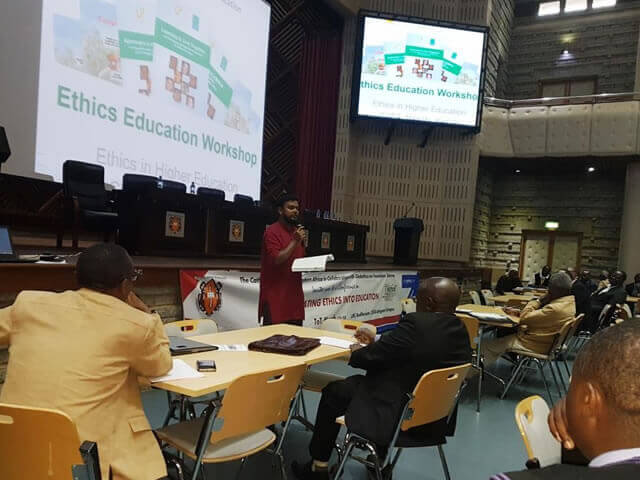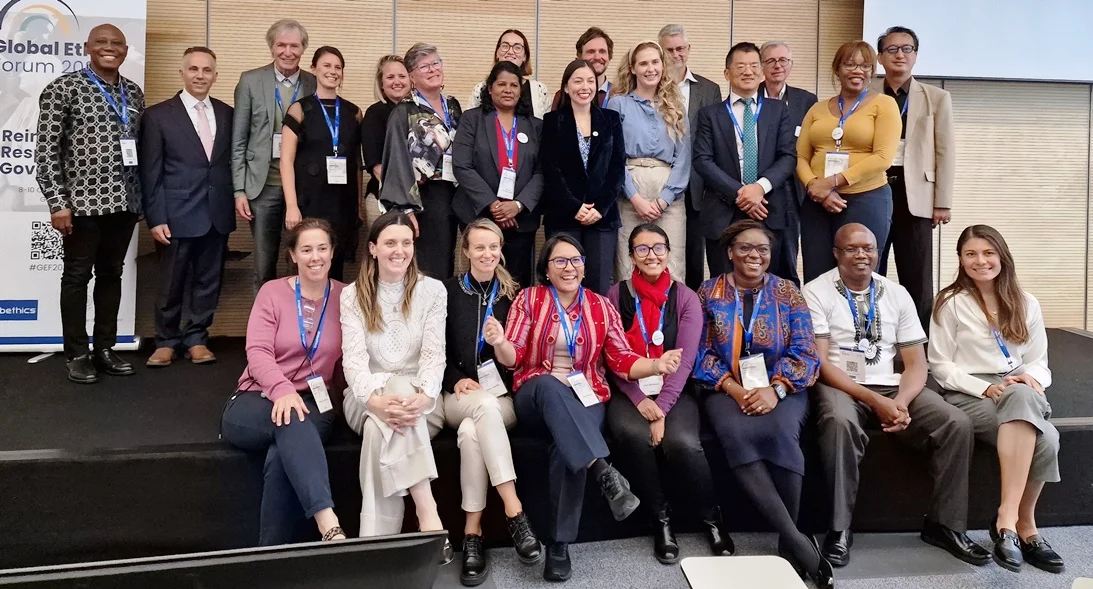
The Catholic University of Eastern Africa (CUEA) in collaboration with Globethics.net held a train the trainers workshop at the Learning Resource Centre in CUEA from 13-16 March 2018.
The workshop was catered towards CUEA's academics staff, heads of administrative functions in the university, representatives of the constituent colleges of CUEA and academic staff of the seminaries near CUEA. The opening session attracted more than 450 participants, including: Vice Chancellors (or their representatives), directors of various institutions, representatives from the National Commission for UNESCO, Arigatou International Kenya office, IBM Research Africa, CUEA Academic and Administrative staff as well as students from various faculties.
Good will messages from the National Commission for UNESCO, Arigatou International and the Association of Member Episcopal Conferences of Eastern Africa (AMECEA) Secretariat were presented. The speakers noted the critical role that ethics in education plays in the formation of youth. They pledged their collaboration in spearheading and promoting the integration of ethics in education.
In his opening speech, the Vice Chancellor of the Catholic University of Eastern Africa, Prof. Justus Mbae, pointed out that the theme of the workshop 'Integrating Ethics in Higher Education' was timely. He said that it came at a time when government and educationists are reaffirming that universities play a key role in the formation and imparting of values to the society. He argued that ethics was a mandatory subject for all universities and institutions of higher learning. It must therefore be integrated in all programmes and activities. He said, 'For a university to grow, it needs to recognize the integral, constitutive role of ethics in the formation of a flourishing community. This will not be easy unless the entire university community integrates ethics in all her activities.'
He noted that in the world today, many governments and educationists are greatly concerned about the proliferation of societal ills, such as corruption, violence, suicide, numerous forms of addiction, child abuse, terrorism, disrespect for one another just to mention but a few. He went on to state that in order to cure these ills the introduction of values-based education will counter the trend and achieve a society of human beings who have high regard for life and dignity of the human person, call to family, community, and participation, rights and more importantly responsibilities, option for the poor and vulnerable, the dignity of work and the rights of workers, solidarity, as well as care for God's creation.
The keynote speech delivered by Globethics.net's Executive Director, Msgr Prof. Obiora Ike, focused on the importance of integrating ethics in higher education. Prof. Ike powerfully stated that 'there is no sustainable development without integration of ethics in higher education'. He started his speech by describing the global context for sustainable development followed by reasons why ethics still matters in the world today. He pointed out that in the world today we live in a time of great uncertainty with unprecedented political, environmental, social and economic challenges worldwide where there is a real concern for better governance as well as a call for more transparency and accountability. He also noted that there is loss of trust in political and business leaders as well as poverty reduction and wealth creation remaining weak. It is a time when there is demand for new forms of development model and policy not forgetting the global agenda with sustainable development goals 2030 in the list.
In discussing the local context for sustainable development, he noted that about half of Kenyans live in absolute poverty despite Kenya being independent for the last 54 years. Countries like Korea and Singapore, which were once at the same level economically, have since taken off and left the east African state behind. According to the facts and figures he shared that 79% of Kenyans live in rural areas. He noted that erratic weather patterns and climate change have contributed to high poverty levels. Similarly, HIV/AIDS pandemics has brought the life expectancy to 55 years old and more Kenyans to greater poverty. He also pointed out that women in rural areas represent a vulnerable group among other facts.
In emphasising the critical role of university education in the developing countries, Prof. Ike said, ‘University education is more than the next level in the learning process; it is a critical component of human development worldwide. It provides not only the high-level skills necessary for every labour market but also the training essential for teachers, doctors, nurses, civil servants, engineers, humanists, entrepreneurs, scientists, social scientists, and a myriad of other personnel. It is these trained individuals who develop the capacity and analytical skills that drive local economies, support civil society, teach children, lead effective governments, and make important decisions which affect entire societies.'
He concluded by saying that the four day training workshop would cause a paradigm shift within the Catholic University of Eastern Africa. This would be achieved in four steps: (1) by embedding an ethical culture and responsible leadership among teachers and supervisors; (2) by building future leaders to lead on ethical innovation, sustainable job creation and human development; (3) by engaging in dialogue and action on ethics and sustainability within CUEA among teachers, supervisors and key stakeholders; and (4) by setting up a committed local Academic Community of Ethical Faculty Leaders (ACEFL).
A total of 120 participants took part in the entire training of trainers workshop.




